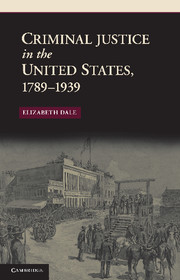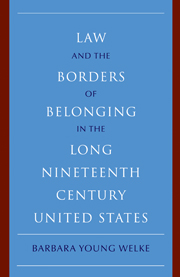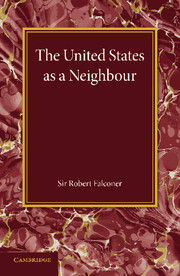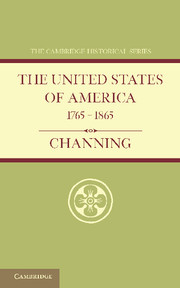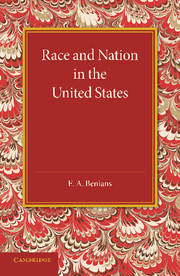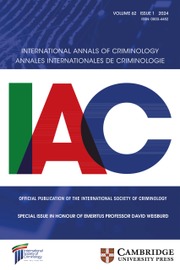Criminal Justice in the United States, 1789–1939
This book chronicles the development of criminal law in America, from the beginning of the constitutional era (1789) through the rise of the New Deal order (1939). Elizabeth Dale discusses the changes in criminal law during that period, tracing shifts in policing, law, the courts and punishment. She also analyzes the role that popular justice - lynch mobs, vigilance committees, law-and-order societies and community shunning - played in the development of America's criminal justice system. This book explores the relation between changes in America's criminal justice system and its constitutional order.
- Relates criminal justice to popular justice
- Explores the relation between criminal law and constitutional order
- Uses the history of criminal law to explore the nature and extent of the state in US history
Reviews & endorsements
“This is a highly comprehensive, thoughtful, and insightful overview of the history of American criminal justice over the course of the long nineteenth century. Remarkably sensitive to larger trends and local nuance in the development of American criminal justice, Elizabeth Dale’s masterful book should be read by all interested in the history of American law.” – Michael J. Pfeifer, author of The Roots of Rough Justice: Origins of American Lynching
“This fine book provides both a broad synthesis and a thought-provoking interpretation of criminal justice in the United States from 1789 to 1939. Elizabeth Dale’s analysis contains many moving parts: federal and state governments, courts and legislatures, judges and juries, constitutional rulings and lynch mobs, and more. The book’s emphasis on the ever-changing interplay between formal law and popular notions of justice invites readers to reflect on the enduring tension between the rule of law and democracy.” – John Wertheimer, Davidson College
"...a concise, engaging, and provocative synthesis...Dale offers a far-ranging and compelling analysis of the halting process of state formation in nineteenth-century America. Most important, she demonstrates the ways in which traditions of popular justice survived well into the twentieth century, sometimes challenging formal legal institutions, sometimes undermining them, sometimes subtly influencing them, and often disrupting the rule of law in the process." - Jeffrey S. Adler, H-Law
"By describing the national, provincial, and popular struggle over how to define and control criminal justice in the US, Dale has provided a most valuable contribution to those interested in the relationship between order and law. Essential." -Choice
"...concise, engaging, and provocative synthesis..." -Ethan Zadoff, H-Law
Product details
August 2011Hardback
9781107008847
190 pages
224 × 145 × 15 mm
0.35kg
Available
Table of Contents
- 1. Criminal justice and the nation, 1789–1860
- 2. Law and justice in the states, 1789–1839
- 3. Law vs justice in the states, 1840–65
- 4. States and nation, 1860–1900
- 5. Criminal justice, 1900–35
- 6. Rights and the turn to law, 1937–9.

